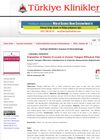7 citations,
January 2020 in “The journal of investigative dermatology/Journal of investigative dermatology” NIPP1 is important for healthy skin and could help treat skin inflammation.
 4 citations,
August 2018 in “International Journal of Current Microbiology and Applied Sciences”
4 citations,
August 2018 in “International Journal of Current Microbiology and Applied Sciences” Eclipta prostrata leaves contain various compounds with medicinal properties.
3 citations,
May 2014 in “Journal of the Egyptian Women's Dermatologic Society /Journal of the Egyptian Women's Dermatologic Society” Bimatoprost may help treat hair loss from alopecia areata.
2 citations,
June 2023 in “Journal of clinical medicine” Soy supplements improve various skin conditions and aging signs, with topical use boosting skin barrier function.
 1 citations,
November 2023 in “Biomaterials advances”
1 citations,
November 2023 in “Biomaterials advances” Sponges made of soy protein and β-chitin with human cells from hair or fat can speed up healing of chronic wounds.
 1 citations,
October 2022 in “International Journal of Molecular Sciences”
1 citations,
October 2022 in “International Journal of Molecular Sciences” Using healthy donor stem cells can potentially calm overactive immune cells and reduce inflammation in severe hair loss patients, offering a possible treatment method.
 1 citations,
January 2018 in “Turkiye Klinikleri Journal of Dermatology”
1 citations,
January 2018 in “Turkiye Klinikleri Journal of Dermatology” Vitamin D levels are not correlated with chronic hair loss in Telogen Effluvium patients.
 December 2024 in “Journal of Clinical Medicine”
December 2024 in “Journal of Clinical Medicine” Minoxidil shows promise for alopecia areata, but more research is needed before it can be recommended as a primary treatment.
 April 2024 in “The Egyptian Family Medicine Journal/The Egyptian Family Medicine Journal ”
April 2024 in “The Egyptian Family Medicine Journal/The Egyptian Family Medicine Journal ” Vitamin D supplements significantly improved post-COVID-19 symptoms in deficient patients.
April 2019 in “Journal of Investigative Dermatology” Alopecia Areata patients have too many Firmicutes and too few Bacteroides in their gut.
May 2018 in “The Journal of Immunology” A(1-7) treatment reduces symptoms of lupus in mice.
269 citations,
October 2018 in “International journal of biological macromolecules” Hyaluronic acid is effective for skin rejuvenation and should be a key ingredient in cosmetic products.
263 citations,
February 2020 in “International journal of molecular sciences” ADSCs help in wound healing and skin regeneration but need more research for full understanding.
166 citations,
February 2005 in “Behavioural brain research” Vitamin D receptor knockout mice have significant motor impairments but no cognitive deficits.
143 citations,
January 2004 in “Journal of Investigative Dermatology Symposium Proceedings” Alopecia areata is an autoimmune disease causing hair loss, treatable with immune-modulating drugs, and linked to genetics.
137 citations,
January 2006 in “Frontiers in bioscience” CRH in the skin acts like the body's stress response system, affecting cell behavior and immune activity.
136 citations,
April 2010 in “British Journal of Dermatology” Acitretin is effective for severe skin conditions but has significant side effects and requires careful monitoring.
124 citations,
January 2012 in “Journal of Allergy and Clinical Immunology” Endocannabinoids help control mast cell activity in human skin.
 73 citations,
April 2019 in “Experimental Dermatology”
73 citations,
April 2019 in “Experimental Dermatology” The scalp's microorganisms significantly affect hair health and disease.
48 citations,
May 2018 in “Expert Opinion on Therapeutic Targets” Gut health may influence Alopecia Areata, suggesting new treatments.
47 citations,
December 2011 in “Experimental Dermatology” CGRP may help protect hair follicles from immune system attacks, potentially slowing hair loss.
18 citations,
July 2016 in “Clinics in dermatology” Nutrition affects skin health differently based on age and condition.
17 citations,
November 2009 in “Dermato-endocrinology” Medium-dose prednisolone pulse therapy is effective and safe for multifocal alopecia areata but not for more severe forms.
14 citations,
April 2021 in “International journal of molecular sciences” Mesenchymal stem cells may help treat hair loss by improving hair cell growth and reducing inflammation.
14 citations,
July 2017 in “Fitoterapia” Oleanolic acid promotes hair growth by increasing cell proliferation through the Wnt/β-catenin pathway.
14 citations,
November 2016 in “Lupus” Lenalidomide effectively and safely treats skin symptoms in pediatric lupus, reducing the need for prednisone.
14 citations,
January 2015 in “Annals of dermatology/Annals of Dermatology” Corticosteroid pulse therapy is more effective for severe alopecia areata than combination therapy.
 13 citations,
November 2022 in “Chemical Science”
13 citations,
November 2022 in “Chemical Science” Inorganic-based biomaterials can quickly stop bleeding and help wounds heal, but they may cause issues like sharp ion release and pH changes.
 13 citations,
November 2021 in “Frontiers in Immunology”
13 citations,
November 2021 in “Frontiers in Immunology” Melatonin could be an effective treatment for Alzheimer's Disease and rosacea.
13 citations,
April 2019 in “International journal of molecular sciences” Acyzol could help treat conditions caused by zinc deficiency.








